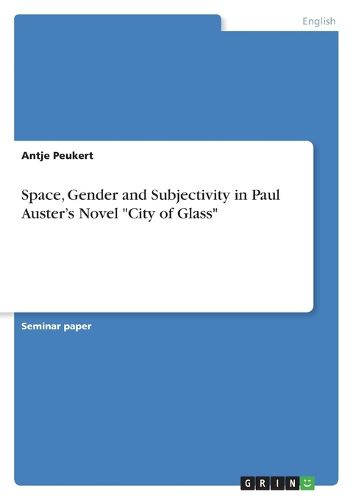Readings Newsletter
Become a Readings Member to make your shopping experience even easier.
Sign in or sign up for free!
You’re not far away from qualifying for FREE standard shipping within Australia
You’ve qualified for FREE standard shipping within Australia
The cart is loading…






Seminar paper from the year 2002 in the subject English Language and Literature Studies - Literature, grade: 1,0, University of Potsdam, course: New Women in the 19th Century, language: English, abstract: I’m not really out to prove anything. In fact, it s all done tongue-in-cheek. An imaginative reading, I guess you could say. This is what Paul Auster (the character) says to Daniel Quinn in Auster’s novel City of Glass about his essay on Don Quixote. The following paper on Auster’s novel City of Glass is not written tongue-in-cheek but it is adventurous nonetheless. Based on Linda Hentschel’s theory of pornotopical techniques of looking, I will concentrate my reading of Auster’s text on aspects orientated towards gender, space, self and subjectivity. I am going to take up Hentschel’s ideas of space, especially in regard to urban space, the city, and also her ideas of how subjectivity is constructed along gendered lines. I will try to show that although Auster’s text challenges and destabilizes ideas and concepts like rationality, language and body, it keeps to a common gender model. Women as characters are visibly absent from the text. If they appear at all they do it marginally and only to trigger off some action, staying passive themselves. The text tells about different kinds of manhood. All main characters are male and I think exactly this setting can only be made (perhaps even unconsciously) in contrast to its constructed female Other. So femininity becomes visible not primarily in the form of characters but in form of particular concepts. I suggest that the city in City of Glass, which is New York, serves as metonomy for different concepts of woman , for example the mother, the (dead) wife and the lover. Daniel Quinn, the main character of the novel incessantly walks the city but instead of reinforcing or even establishing a subjective position in the vast metropolis he fails completely and dissolves within the urban space. As such he is not only the absol
$9.00 standard shipping within Australia
FREE standard shipping within Australia for orders over $100.00
Express & International shipping calculated at checkout
Seminar paper from the year 2002 in the subject English Language and Literature Studies - Literature, grade: 1,0, University of Potsdam, course: New Women in the 19th Century, language: English, abstract: I’m not really out to prove anything. In fact, it s all done tongue-in-cheek. An imaginative reading, I guess you could say. This is what Paul Auster (the character) says to Daniel Quinn in Auster’s novel City of Glass about his essay on Don Quixote. The following paper on Auster’s novel City of Glass is not written tongue-in-cheek but it is adventurous nonetheless. Based on Linda Hentschel’s theory of pornotopical techniques of looking, I will concentrate my reading of Auster’s text on aspects orientated towards gender, space, self and subjectivity. I am going to take up Hentschel’s ideas of space, especially in regard to urban space, the city, and also her ideas of how subjectivity is constructed along gendered lines. I will try to show that although Auster’s text challenges and destabilizes ideas and concepts like rationality, language and body, it keeps to a common gender model. Women as characters are visibly absent from the text. If they appear at all they do it marginally and only to trigger off some action, staying passive themselves. The text tells about different kinds of manhood. All main characters are male and I think exactly this setting can only be made (perhaps even unconsciously) in contrast to its constructed female Other. So femininity becomes visible not primarily in the form of characters but in form of particular concepts. I suggest that the city in City of Glass, which is New York, serves as metonomy for different concepts of woman , for example the mother, the (dead) wife and the lover. Daniel Quinn, the main character of the novel incessantly walks the city but instead of reinforcing or even establishing a subjective position in the vast metropolis he fails completely and dissolves within the urban space. As such he is not only the absol